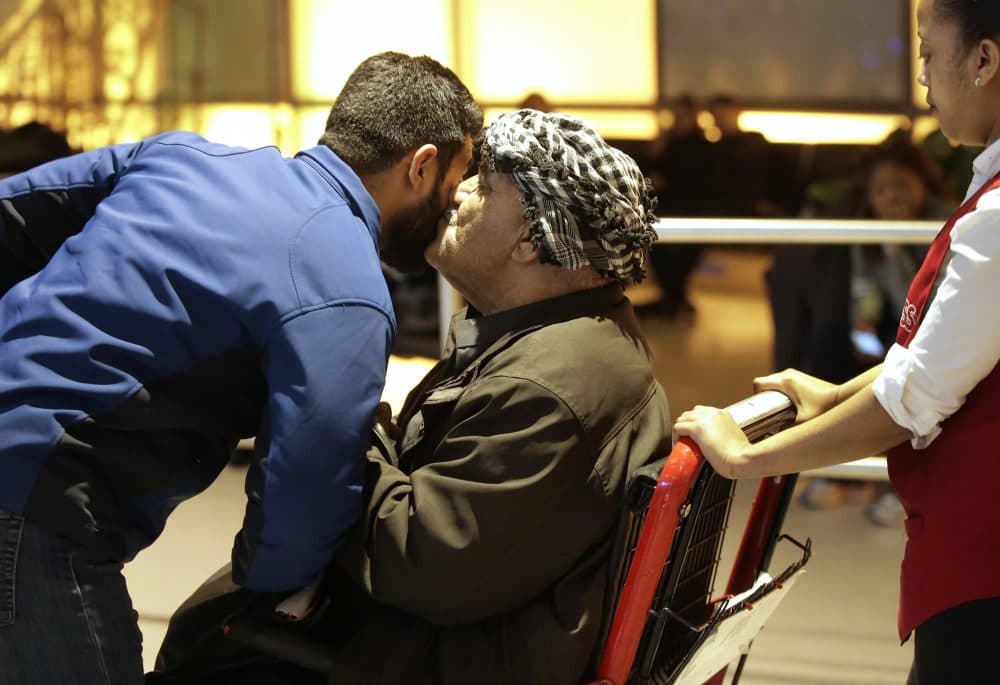Advertisement
Boston Judge Denies Extension Of Stay Of Trump's Immigration Order

Update: Shortly after the Boston judge's ruling on Friday evening, a federal court judge in Seattle issued a nationwide temporary stay on President Trump's executive order barring travel to the U.S. for refugees and people from seven predominately Muslim countries. The federal government has said it will appeal the Seattle judge's ruling.
The ACLU of Massachusetts said the organization believes the Boston temporary restraining order remains in effect until Monday night at 11:59 p.m., citing federal rules of civil procedure. Susan Church, head of the New England chapter of the American Immigration Lawyers Association wrote in an email, that even though the Boston stay on Trump's travel ban was not extended by Judge Gorton, "the Seattle order is broad and Customs and [the Department of Homeland Security] have publicly indicated their assent."
Original post:
A federal judge in Boston on Friday decided not to extend a temporary restraining order against President Trump's controversial immigration executive order.
That means the current seven-day injunction, which was granted Jan. 29, expires just before 2 a.m. Sunday, according to the plaintiffs' lawyers.
The executive order temporarily suspends U.S. travel from seven predominately Muslim nations and all admission of refugees, and bars Syrian refugees indefinitely.
Judge Nathaniel Gorton, a President George H.W. Bush appointee, issued his ruling just after 5 p.m. Friday — a few hours after a hearing on the matter in federal court.
"Because the plaintiffs have not demonstrated that they are likely to succeed on the merits of any of their claims," Gorton wrote in his 21-page decision, "an extension of the restraining order at the present time is not warranted."
In court Friday, Gorton reminded those gathered that the hearing was not about immigration rights or about the merits or demerits of the executive order. Instead, he said it was about potentially extending the seven-day restraining order.
In a statement, the ACLU of Massachusetts said it was "deeply disappointed" in the ruling. In its own statement, Oxfam, one of the plaintiffs on the petition, slammed Trump's executive order and also said it was "disappointed" in Gorton's decision.
Matthew Segal, the ACLU's legal director, presented arguments for the plaintiffs and several times implored the judge to consider the intent of the president's executive order, not strictly the words used in the order.
Judge Gorton repeatedly read from Trump's order, at one point asking the plaintiffs' attorneys: "Where does the executive order specifically mention a Muslim ban or majority-Muslim countries?"
Segal mentioned several of Trump's campaign promises, specifically his calling for a "Muslim ban," and Segal also referenced tweets to the same effect. "This is a case that can hinge on the government's intention," he said, emphasizing what he called the White House's desire to fulfill a campaign promise.
In his decision, Gorton wrote that five lawful permanent residents listed as plaintiffs are not affected by the executive order — only after clarification from the White House this week — and their claims are moot.
And for two plaintiffs holding student (F-1) visas, Gorton wrote that assuming the State Department revoked their visas, "the F-1 plaintiffs have no property or liberty interest in those visas and thus no due process claim with respect to the supposed revocation."
Gorton said these plaintiffs are here in the country now and there is no indication that the government is seeking to deport them. "If they choose to leave the country, as non-resident aliens, they have no right to re-enter," he wrote.
Before the ruling, the ACLU's Segal had said there's going to be substantial chaos here in Boston and around the world if this temporary restraining order expires.
With reporting by WBUR's Benjamin Swasey
This article was originally published on February 03, 2017.
